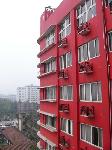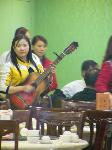- Getting around Lijiang. Dont stay in the Old Towns more than 2 days, there is nothing to do. KRISS Oct 9, 2013 05:46
- 2013 Beijing Temple Fair BENNYLAU Feb 26, 2013 03:29
- Malaysian traveling from KUL - LAX vis Shanghai PVG ZATI_DY Jan 3, 2013 20:15
A Day in the Life of a Traveller
- Views: 7654
- |Vote: 1 0
- |Add to Favorites
- |Recommend to Friends
Railside Hotel
I have to admit, I'm a scrooge when it comes to hotels. For a place I'm only going to stay a single night in, I couldn't care less how clean it is - as long as I can have a wash myself, and can get a good night's sleep, it's fine by me. I've stayed in some places that most foreign travellers in China wouldn't touch - some of them even hardy backpackers would turn their noses up at, with communal showers and dirty linen, and crawling with bugs. I figure once you've soaped yourself off and walked out the door, the money you've saved is worth the slight inconvenience.
The cheapest hotel I ever stayed at was in Xi'an, for RMB10 a night, and the second was at Wuhan, where I shared a room with a fellow traveller for RMB15 each. Both of those hotels were small inns near the railway station, where travellers can often find a cheap bed with minimal fuss. So this time, when I was returning to Wuhan, I figured it'd be a good idea to walk straight out of the station and into a cheap room once again.
I arrived at Hankou station in the north of Wuhan after a very long train journey, on a warm afternoon, desiring nothing more than a shower - and suddenly, my idea of finding a cheap, dirty inn didn't seem like such a bright one after all. I noticed a grubby loft next to the station and promptly changed my mind, wondering if there were any better options.
To my surprise, the closest place to stay was a massive, five-star establishment called the Oriental Hotel, standing gloriously out of place across the station yard. It had to be the most luxurious station hotel I'd ever seen, and so I wandered across with my luggage to see what their rates were - perhaps I could treat myself to some luxury for a change.
However, a discounted room rate of RMB536 was a little more than my budget could accept for a single night, no matter how many roses were on the pillow slip. The average price I normally pay for a room with bathroom is RMB120-150, and I had to admit that the difference in comfort really isn't as much as the difference in price.
Fortunately, a reasonable alternative stood right behind - in a bright red building called the Jun An hotel. It's not immediately visible from the station, but after I'd walked around the Oriental, it was the most noticeable building on the whole street. What was more, it seemed likely to be clean and comfortable, which was about all I needed at this stage.
I walked in and talked to the very well-presented girl at reception, listening very carefully so as to make sure I understood her heavy lisp. The rate she offered me was RMB228, for which I got a large, comfortable room that was no less well-serviced than the Oriental, at half the price. A very hot shower later, I was refreshed and ready to face Wuhan, only a little lighter in the wallet.
Station Food
Living around the railway area also ensured cheap meals, which made up in part for the cost of the room. Near the Jun An hotel is a row of extremely affordable restaurants, all of which advertise meals starting from only RMB3. This is also a good place to try Wuhan's famous fish - the Wuchang Yu, a fat fish with a funny small face that is found off the shore in the Yangtse river - China's most famous - which bisects Wuhan and links the city to Chongqing and Shanghai by boat. The restaurant I tried (the Jing Han) offered a serving of Wuchang Yu poached in a spicy sauce for only RMB20.
Despite being close to the station - a location that in most cities spells dirty, and not usually a good place to find a meal - the tiny restaurants around the Hankou station seem very hygiene conscious, with individually wrapped utensils sterilised by a specialist company in the area. A shrink-wrapped set of plates, cups and chopsticks is an extra yuan on the bill, and well worth the expense for the sake of health. Hygiene is generally, however, the preserve of the tabletop - floors of most Chinese restaurants are filthy, in keeping with the nationwide belief that floors are irrevocably dirty in the first place and often not worth sweeping up. The secret to keeping clean in China when the floors are so bad is thus very simple - don't touch the floor. If you have to sit down, lay paper so that even your clothing doesn't make contact with it. Don't touch your shoes against anything - and never, ever eat anything that has fallen onto the ground. Keeping that simple rule in mind, it's possible to enjoy a meal at many restaurants without feeling disgusted by a glance downwards.
A Bus to Somewhere
One of the best ways to explore, of course, is by getting lost. I was planning on heading to Zhongshan Dadao for the evening, the old quarter of Hankou where I'd read that colonial houses from a century ago still existed and where the centre of town really is. In fact, in the one time I'd visited Hankou about five years before, I'd been in an area with old colonial buildings, and so I figured it must be the same place the book was talking about - but the question was, how to get there? There were plenty of busses leaving from the station, but as I scanned their routes and double-checked against my map, I couldn't see anything that helped.
I knocked on a window at the information booth and had only just got through an "excuse me" when the attendant shouted at me - couldn't I see the door was open? Why did I have to talk to her through this little window? I moved around to the back door, and waited as she got up off her desk and walked back to the open door, coming to stand with her arms folded angrily. "Well? What do you want?" I asked about a bus to Zhongshan Dadao, and she pointed to the bus right next to me, and walked back to her seat. I dutifully got on board.
The bus twisted into the dark suburbs, far beyond my ability to follow its turns on my map. All I knew was that we were headed in the direction of the river. It helps to know regarding Wuhan that it's actually a megacity - a great conglomeration of three cities melded into one. The great Yangtse River curves along the landscape as another broad river, the Han, flows into it, creating a 'Y' bend dividing three distinct districts, each a city in its own rights. These three cities, Hankou, Hanyang and Wuchang are historically cities with distinct, seperate identities, but their proximity has led them to grow into each other as bridge after bridge was built across the waters, to become the all-encompassing Wuhan. I was in Hankou in the northwest, motoring in the general direction of the Yangtse, fearing at any moment that if I didn't pay attention we might suddenly turn onto a bridge over one of the rivers, leaving me in a different city.
I recognised a road name and promptly got off the bus, only to realise I still wasn't quite as close to Zhongshan Dadao as I'd thought. I decided to wander to the next main road to check my bearings and measure the distance, to see if I could walk the last few kilometres before giving up and hailing a taxi.
My wandering happily led me to a bright outdoor eatery, colourful and boisterous and exactly the kind of interesting place I'd never have found if I hadn't been lost. Ji Qing Jie, right at the western end of Zhongshan Dadao, is a wonderful avenue of outdoor restaurants that is unusual in that it is crawling with musicians who approach diners, offering to play a song for a few kuai. The air is full of music: guitarists, Chinese opera singers, saxophonists, traditional Chinese instrumentalists - some musicians even massaged customer's shoulders as they sang.
This is not a place to come if you're not willing to join the fun - for the performers sit and talk with customers right at the table, and will play songs for you even if you refuse. This is a place to be happy you're in Wuhan in, even if you are lost.
Allen Story
I finally found my way to Zhongshan Dadao, by which time it was late in the evening and beginning to lightly rain. But I'd finally found my destination, and began walking along the road again with a sense of purpose.
It was at about this time that I realised that Zhongshan Dadao is a very long road, and that the area I was trying to find may or may not actually be somewhere on, or somewhere just off, this road. Indeed, from where I was standing, Zhongshan Dadao looked rather not unlike any ordinary street in any big city in China, and I suddenly realised that even though I'd found where I was heading for, it wasn't where I was planning to be during the evening.
Beyond that, it was starting to rain even more, and so I decided to duck inside. I'd been walking twenty minutes or so and had gotten totally lost in the side streets, but across the road from where I was standing were some pretty lights twinkling in the doorway of a cafe/bar, and so I decided to have a warm drink.
It was the right choice, because a cup of milk tea at Allen Story was about the best part of the day, and the first time I'd felt anything like the feeling of being at home since arriving in Wuhan. Allen Story is a chain that started in Chongqing city and has now opened here - deeply service oriented, the bar is intimate in design, even romantic - and the amount of cards, coupons and smiles the staff lavish upon you is almost bewildering. But Allen Story's trademark is a simple writing book which patrons are encouraged to write or sketch in as they chat. I was handed the notebook, already scribbled in with pages and pages of comments from previous customers - I smiled and wrote my own notes in English alongside the Chinese.
Wuhan is a major city, and I'd spent the day there without really visiting any major sites, seeing any jaw-dropping scenery or experiencing anything typical of the region - but travel is often this way, and the secret to really enjoying it is to take everything in your stride. That way, spending simple days like this becomes something quite wonderful, and is the closest feeling to freedom you'll ever get.
TRAVELLER'S TIPS
Jun An Hotel:
54 Jindun St, East Hankou Railway Square Road, Jianghan District, Wuhan.
Phone (+86-27) 5053 9088 - 808, 818, 828
http://www.junanhotel.com/
info@junanhotel.com
武汉市江汉区汉口火车站广场东路金墩街54号
Allen Story:
12 Sanyang Road, Hankou, Wuhan.
Phone (+86-27) 6266 5170, 6357 7028
http://www.allenclub.cn
allen@allenclub.cn
汉口三阳路12号 (离江滩入口50米)







 Copyright © 1998-2026 All rights reserved.
Copyright © 1998-2026 All rights reserved.
1.
Mar 11, 2007 10:37 Reply
TOAD said:
Was suppose to visit Wuhan but have changed plans so am going Xiamen instead. Having read your article makes me all the more wants to visit Wuhan. I agree sometimes the best way to see a place is to get lost in the side streets. . . but am not sure about bug filled sheet though. . .